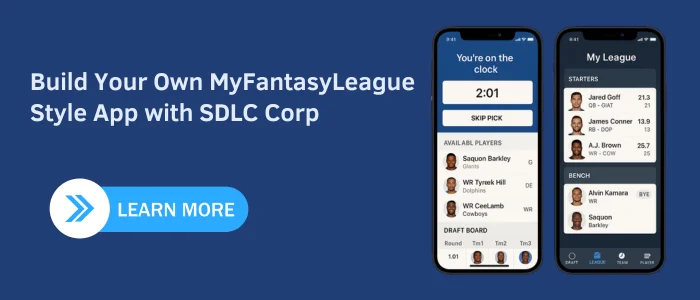Introduction
Fantasy sports has become a serious digital business, and MyFantasyLeague shows what a mature fantasy football platform looks like. As a result, many founders want to build similar fantasy apps to attract loyal, engaged players. However, success depends on solid engines for drafts, scoring, trades, and real-time stats, not just design.
In this guide, you’ll learn the key features, architecture, tech stack, costs, and timelines involved in building a production-ready fantasy app like MyFantasyLeague. SDLC Corp is a fantasy sports app development company that helps you turn these ideas into a live, scalable fantasy platform.
What Makes MyFantasyLeague Unique?
Core Features of a Fantasy App Like MyFantasyLeague
1. User and League Management
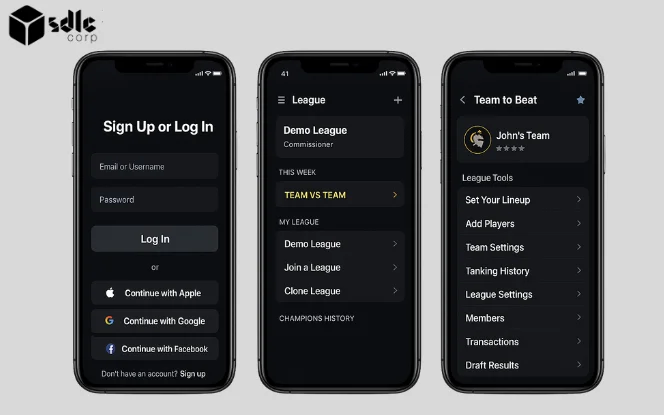
A modern fantasy platform should make it effortless for users to sign up, create leagues, and invite friends. Strong league and role management keeps commissioners in control and reduces manual work.
Easy signup and login (email, phone, or social)
Create, join, or clone leagues in a few simple steps
Role-based access for owners, commissioners, and players
For a broader overview of fantasy sports app planning beyond MyFantasyLeague, check out our complete guide on how to develop a fantasy app.
2. Draft and Team Management
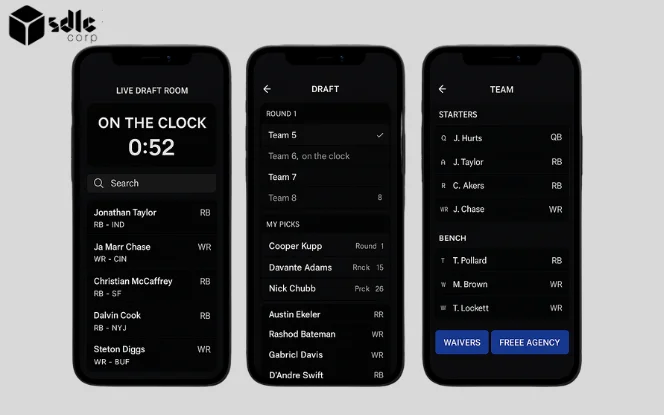
The draft is the heart of any fantasy season. A clear, responsive draft experience keeps users engaged and reduces confusion, especially in competitive leagues.
A strong draft and team management module should include:
A live draft room with timers, a visible queue, and real-time updates
Support for multiple draft types, including snake, auction, and offline drafts
Roster and bench management with waivers, trades, and free agency tools
3. Live Scoring and Leaderboards

Real time scoring is what keeps players checking the app all weekend. If updates lag or feel inaccurate, trust in the platform drops quickly, especially in competitive or paid leagues.
A strong live scoring and leaderboard experience should include:
Real-time scoring updates synced with live matches
Weekly matchup views plus full-season league standings
Playoff brackets with clear team paths and basic player and team stats
4. Social and Community Features
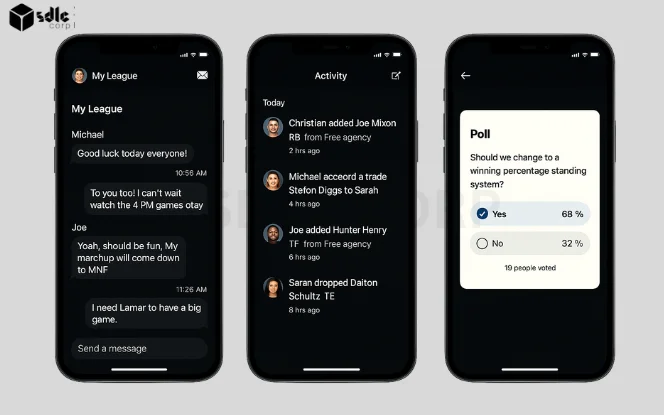
Fantasy leagues are social by nature. Strong communication tools keep leagues active even between game days.
League chat and direct messaging
Activity feed for trades, pickups, and key events
Simple polls or announcements for rule changes
5. Notifications and Alerts

Timely notifications help users stay on top of lineups, injuries, and trades without constantly checking the app.
Lineup reminders before match deadlines
Trade, waiver, and injury alerts
Real-time push notifications for important in-game events
6. Commissioner Controls
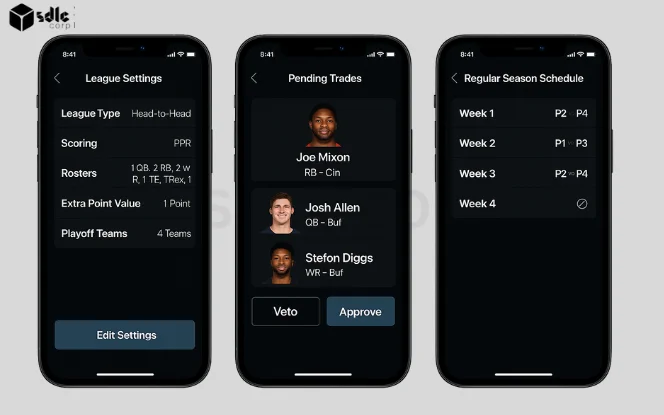
Commissioners are your power users. The more control and transparency they have, the more likely they are to keep their league on your platform year after year.
Configure league rules, scoring, and formats
Approve or veto trades with clear criteria
Adjust schedules and handle rare score corrections
7. Payments and Rewards (If You Monetize)
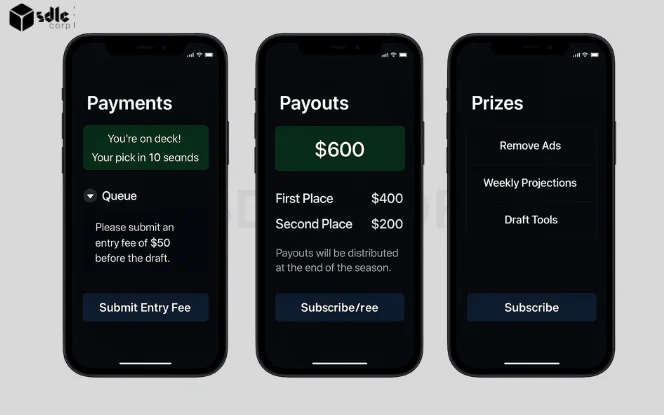
If your platform handles paid contests or entry fees, payments must be simple, transparent, and compliant.
Entry fee and basic payout handling (where legal)
Integration with secure payment gateways
Support for prizes, subscriptions, or premium features
Technology Stack for a Fantasy App Like MyFantasyLeague

Cost Breakdown: Developing a Fantasy App Like MyFantasyLeague
| Tier | Timeline | Estimated Cost | Key Features |
|---|---|---|---|
| Basic Version (MVP) | 12–16 Weeks | $10K – $20K |
|
| Standard Fantasy App | 18–24 Weeks | $25K – $40K |
|
| Advanced Solution (MyFantasyLeague-Level) | 24–36+ Weeks | $50K – $80K+ |
|
Monetization Strategies for a Fantasy App Like MyFantasyLeague
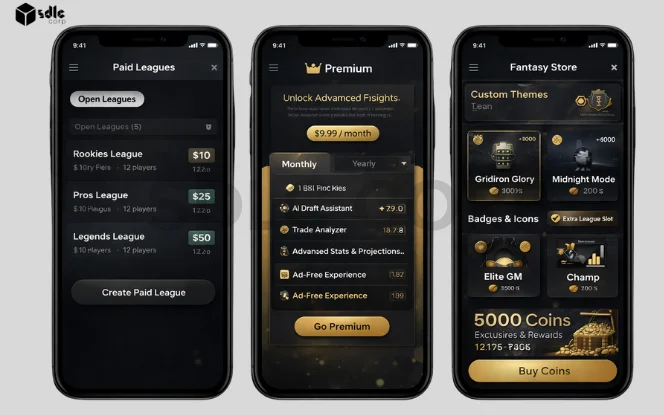
A strong monetization plan turns your fantasy platform into a sustainable business instead of a seasonal side project. MyFantasyLeague-style apps usually lean on long-term leagues, serious commissioners, and highly engaged communities which opens multiple revenue streams beyond just ads.
Here are proven ways to monetize a deep, commissioner-focused fantasy platform:
1. Entry Fees and Prize Pools (Where Legal)
Paid leagues with transparent entry fees and rule based payouts
Different buy in levels for casual, competitive, and high-stakes leagues
Optional side pots or custom prize structures for advanced users
2. Subscriptions and Premium Features
Monthly or yearly subscriptions for advanced tools and stats
Access to AI-based insights, projections, draft helpers, and trade analyzers
Ad-free experience and early access to new features for premium users
3. In-App Purchases and Add-Ons
Custom themes, badges, and cosmetic upgrades for leagues and teams
Extra league slots or team slots for highly active players
Advanced analytics packs with deeper reports and historical insights
4. Sponsorships, Ads, and B2B Deals
Banner and native ads integrated carefully without hurting UX
Sponsored leagues powered by brands, clubs, or influencers
White-label or co-branded versions for teams, leagues, or enterprises
When you think about monetization during the planning phase, you can design features, pricing, and user journeys that feel fair and transparent while still supporting strong revenue growth.
Security & Compliance for a Fantasy App Like MyFantasyLeague
Strong security and compliance are non-negotiable for any platform that handles personal data, payments, and in some regions real-money contests. A fantasy app that feels “unsafe” or “unclear about legality” will quickly lose users, no matter how good the features are.
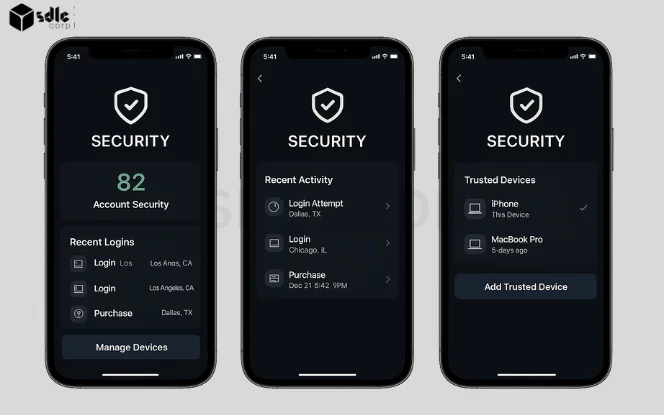
A secure fantasy platform should:
Protect user data with transport-layer encryption (HTTPS/TLS) and secure storage
Use PCI DSS-compliant payment gateways for deposits, withdrawals, and prize payouts
Enforce role based access control (RBAC) for admins, commissioners, and support teams
Maintain audit logs for key actions such as payouts, trade approvals, and rule changes
Follow regional data privacy laws (like GDPR) and local skill-game regulations
Implement rate limiting, bot protection, and basic fraud checks for suspicious activity
These safeguards do increase overall fantasy sports app development cost, but they are essential for building trust with users, avoiding legal trouble, and keeping the platform stable over many seasons.
Architecture of a Scalable Fantasy App Like MyFantasyLeague
To support live scoring, peak traffic on match days, and multi-season league history, you need more than a simple app and database. A MyFantasyLeague style platform benefits from a modular, service oriented architecture.
High-Level Structure
Client layer: Web, iOS, and Android apps used by players, commissioners, and admins
API gateway: A single, secure entry point for all client requests
Service layer: Independent services for auth, leagues, scoring, payments, and notifications
Data layer: Primary transactional database, in-memory cache, and analytics store
Core Services
Auth service: Handles login, registration, roles, sessions, and security policies
League & game service: Manages league rules, rosters, schedules, matchups, and standings
Scoring engine: Consumes live stats from external providers and updates scores in near real time
Payment service: Manages deposits, withdrawals, prize payouts, and transaction history (where legal)
Notification service: Sends email, SMS, and push alerts based on events and user preferences
Data & Performance
Database: PostgreSQL or MySQL for core user, league, and transaction data
Cache: Redis for live scores, leaderboards, and other high-read, time-sensitive data
Scalability: Load balancers, auto-scaling groups, and a CDN to keep the app responsive during peak game windows
Designing the app this way helps you scale from a few test leagues to thousands of active leagues without major rewrites, while keeping the system observable and easier to maintain.
Conclusion
Building a fantasy app like MyFantasyLeague needs clear planning, the right features, and a scalable architecture that can handle live scoring and heavy match day traffic. If you develop a fantasy app like MyFantasyLeague with deep customization, strong commissioner tools, security, and smart monetization, you can build a platform that keeps users engaged for many seasons.
Partnering with an experienced team like SDLC Corp helps you reduce risk and control the real cost to develop a fantasy app like MyFantasyLeague. Ready to get started? Contact SDLC Corp for a personalized consultation and a clear roadmap for your fantasy sports app.
FAQ'S
How Much Does It Cost To Build A Fantasy App Like Myfantasyleague?
For most startups, a MyFantasyLeague-style app costs $20,000–$60,000, depending on features, platforms (web + iOS + Android) and data integrations.
How Long Does It Take To Develop A Myfantasyleague style Fantasy App?
A basic MVP takes around 12–16 weeks. A full product with payments, premium tools and scaling support usually needs 4–6 months.
What Key Features Should My Fantasy App Include?
Must have features are: league and team management, drafts, live scoring, trades/waivers, leaderboards, notifications, basic chat and simple monetization.
Which Tech Stack Is Best For A Scalable Fantasy Platform?
Typical stack: React / React Native for front end, Node.js or .NET microservices on the back end, PostgreSQL/MySQL + Redis, deployed on AWS/GCP with load balancer, auto-scaling and CDN.
How Do Fantasy Apps Handle Live Scoring And Real time Updates?
They use official sports data APIs, a separate scoring engine to calculate points, Redis cache for fast reads, and WebSockets / push notifications for instant updates.
Is It Legal To Charge Entry Fees And Offer Cash Prizes?
It depends on your country and state. Some treat fantasy as skill based and allow real money contests; others restrict it. Always check local laws and get legal advice before launching paid leagues.
How Does A Fantasy App Like Myfantasyleague Make Money?
Main revenue streams are: entry fees (where legal), subscriptions, premium tools, in-app purchases, ads/sponsorships, and white-label solutions for brands or leagues.
Can Your Team Build A Custom Fantasy App Like Myfantasyleague For My Business?
Yes. We design and develop custom fantasy platforms with real-time scoring, secure payments and scalable cloud architecture, fully branded for your league or company.

